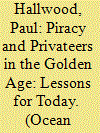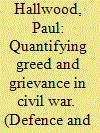| Srl | Item |
| 1 |
ID:
112760


|
|
|
|
|
| Publication |
2012.
|
| Summary/Abstract |
Article 100 of the UN Convention on the Law of the Sea requires parties to "cooperate" against maritime piracy, but how this cooperation is to be achieved is undefined. Enforcement is a public good-creating uncompensated benefits for others, thus suffering from free rider problems. The analysis in this article explains why more pirates captured are released than prosecuted, why the United Nations and the International Maritime Organization are seeking to reduce enforcement costs, why some in the shipping industry want to apply the 1988 Convention Against Terrorism at Sea, and why still others want to move prosecution of pirates from national courts to an international court.
|
|
|
|
|
|
|
|
|
|
|
|
|
|
|
|
| 2 |
ID:
031997


|
|
|
|
|
| Publication |
London, George Allen and Unwin, 1981.
|
| Description |
x, 206p
|
| Standard Number |
0043820271
|
|
|
|
|
|
|
|
|
|
|
|
Copies: C:1/I:0,R:0,Q:0
Circulation
| Accession# | Call# | Current Location | Status | Policy | Location |
| 019921 | 330.91724/HAL 019921 | Main | On Shelf | General | |
|
|
|
|
| 3 |
ID:
160922


|
|
|
|
|
| Summary/Abstract |
Customary international law has governed high seas piracy for many centuries and is now codified in the United Nations Convention on the Law of the Sea (LOSC). In this article, we discuss the reasons why enforcement against piracy today is less effective than three hundred years ago. We contend that crime, including the crime of piracy, can be modeled as a rational choice that is responsive to expected rewards and punishments. Based on this view, we argue that three hundred years ago, the free rider problem resulting from enforcement on the high seas was less prevalent than it is today because seaborne trade was more concentrated in the vessels of a few countries, making enforcement more like internal than international policing. The persistence of piracy today also stems from a continuing low probability of capture coupled with lenient punishments. In addition to enforcement differences, we contrast the sources of piracy in the two eras—in the earlier period, the end of privateering led many privateers to engage in piracy, whereas today, the main source of pirates in the Western Indian Ocean is the existence of a “failed state,” and off West Africa and South East Asia pirates are common criminals.
|
|
|
|
|
|
|
|
|
|
|
|
|
|
|
|
| 4 |
ID:
123167


|
|
|
|
|
| Publication |
2013.
|
| Summary/Abstract |
Greed' vs. 'grievance' is weighed using a generally applicable methodology as motivations in the American War of Independence. Greed is quantified as the expected economic benefit of Independence - escaping colonial trade burdens and expected increased economic growth rates. Grievance is measured as willingness to pay to escape perceived political burdens. Quantification of the relative contributions is made possible by using estimates of expected war-costs. To the extent that the economic burden was insufficient to explain the War, the residual is ascribed to the grievance motivation. Both motives are shown to have contributed to the War, but grievance dominates.
|
|
|
|
|
|
|
|
|
|
|
|
|
|
|
|